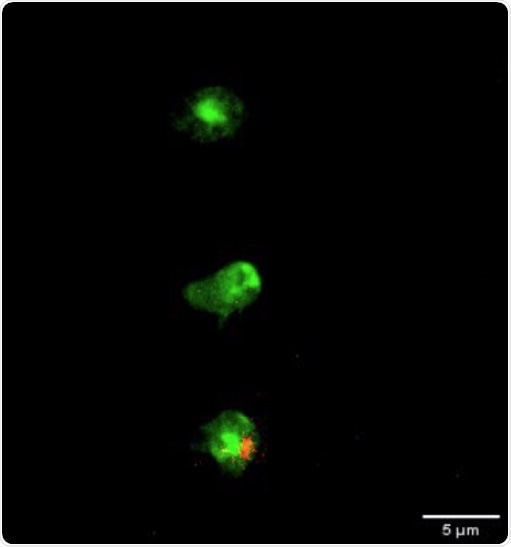Scientists from the Monash Biomedicine Discovery Institute (BDI) recently identified that the therapeutic benefit to patients receiving mesenchymal stromal cell (MSC) therapy is not because the injected cells remain viable but because of cell death.

Apoptotic MSC (red) is engulfed by a macrophage (green). Image Credit: Professor Tracy Heng.
Many efforts were made recently to fabricate stem cell-based therapies for difficult-to-treat diseases. MSC therapy is regenerative cell-based therapy and has shown much promise for the treatment of such diseases.
The results of the BDI research reveal that the therapeutic effects of MSCs are because of the recipient’s immune cells responding to the MSCs undergoing a specific type of cell death—apoptosis—after injection that causes anti-inflammatory effects.
Apoptosis cannot be plainly stated as cell death. It is a controlled process that assures dying cells do not activate unwanted inflammation rather facilitates an anti-inflammatory environment.
The apoptotic cells secrete extracellular factors that have anti-inflammatory or therapeutic effects, which can be used as alternatives to cell-based therapies.
The research headed by Associate Professor Tracy Heng discovered that by disabling apoptosis in MSCs, the cells became inefficient in alleviating disease in models of multiple sclerosis and lung inflammation—diseases where MSCs are, at present, trialed as therapeutic agents.
The observations have been published in the Nature Communications journal.
Associate Professor Heng states that the selection of MSC batches for clinical use in therapeutic cell manufacturing relies on lab analyses that measure the secretion of bioactive factors or expression of specific cell markers by viable MSCs.
By better understanding how immune cells respond to dying MSCs, we may be able to develop new therapeutic strategies that directly target the responding immune cell population to bring about anti-inflammatory effects.”
Tracy Heng, Associate Professor, Monash Biomedicine Discovery Institute
Cell therapies employing MSCs have shown promising results in many diseases, ranging from inflammatory conditions to autoimmunity and organ transplantation. It is anticipated that MSCs produce many soluble factors that impart their therapeutic effects. However, this mode of action does not suit the observation that injected MSCs do not persist in the body.
Knowing how MSC therapy works is important in designing treatment protocols that improve disease outcomes.”
Tracy Heng, Associate Professor, Monash Biomedicine Discovery Institute
Source:
Journal reference:
Pang, S. H. M., et al. (2021) Mesenchymal stromal cell apoptosis is required for their therapeutic function. Nature Communications. doi.org/10.1038/s41467-021-26834-3.